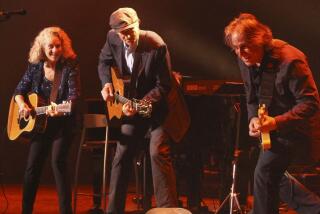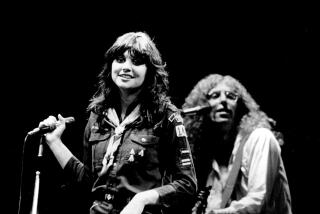Pop Music Review : Skillfully, Kottke Bypasses Flash to Get to Heart
SAN JUAN CAPISTRANO — Leo Kottke, long treasured for his prodigious guitar skills, has another talent that’s every bit as great. And that equally impressive craft--getting to the heart of a song and cradling it front of an audience--was at the center of his Coach House performance Wednesday.
Alternating between six- and 12-string guitars, Kottke played a typically eclectic set, sprinkled with his trademark wry, between-song patter. His casual conversation and sincere musical presentation lent a drawing-room atmosphere to the club’s roadhouse decor. And though his set lasted nearly two hours, time seemed suspended.
Kottke’s ability to focus on a song’s strengths was most apparent on the familiar numbers, the ones we’ve all heard hundreds of times.
As on “Peculiaroso,” his recent CD produced by Ricki Lee Jones, the guitarist made magic from Klaus Gunter-Newman’s “Wonderland by Night,” the nostalgic instrumental ditty that bandleader Bert Kaempfert took to the top of the charts in 1961 (propelled by Charly Tabor’s pinched trumpet solo that, Kottke said later, gave the tune “a guacamole effect”). Here, without the additional instrumental ornamentation heard on “Peculiaroso,” Kottke revealed the song’s soul, bringing out its melancholy beauty without cheap appeals to sentiment.
Likewise “Eight Miles High,” the Byrd’s peace-and-love era anthem that’s easily dismissed as just another drug culture tune, was given a thoughtful, slow-paced airing. This time it was Kottke’s vocal that took center stage, with his careful enunciation and well-separated phrasing revealing the lyric to be a visual statement of alienation, as weighty today as in the heady ‘60s.
At one point, Kottke was so enwrapped in the song’s words that they seemed to escape him and, smiling at his error, he re-entered the verse. But this apparent mistake added impact to the delivery, rather than breaking the mood.
*
Kottke’s voice, never a polished instrument (which he readily acknowledges), played a central role in Wednesday’s show. Compared with his speaking voice, a baritone with all the warmth of grandma’s quilt, it sounds narrow and compact. But he adapts it well, and his tones rang true and clear on such up-tempo laments as “The Room at the Top of the Stairs.”
Kottke also put his considerable skills as a lyricist on display, notably with “Parade,” a poetically haunting piece that reflects a boyhood experience in Cheyenne, Wyo. The tune’s calculated pauses brought depth to his words, framing each phrase to be viewed like a gallery-hung painting.
But it was Kottke’s guitar stylings that remained most impressive. A listen to the recently reissued compilation “6- and 12-String Guitar” from 1969 shows his current work to have more polish, ringing with an almost orchestral depth while ranging freely along the full scale of his instrument.
His Coach House playing was so pure, precise and filled with ringing chords that one almost forgot about the technique required to produce such a sound. But Kottke himself seemed to point up his talents by frequently adding a dramatic pause after an especially difficult passage, something that still managed not to distract from his presentation.
*
Opening act Cathy Cornell, who worked solo from an electric keyboard, provided lighter fare with original tunes that, among other things, discussed serial love affairs, pushovers for love and cross-dressers.
Accompanying herself with strong blues and barrel-house piano play, Cornell came across best during her more humorous pieces. But her ballads, simple tales of love and loss, fell flat with bland lyrics and a predictable sincerity.
Applying the same intelligence to her serious pieces as she demonstrates on the slice-of-life numbers would bring that material up several notches.
More to Read
The biggest entertainment stories
Get our big stories about Hollywood, film, television, music, arts, culture and more right in your inbox as soon as they publish.
You may occasionally receive promotional content from the Los Angeles Times.








